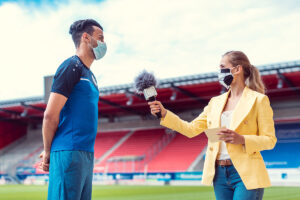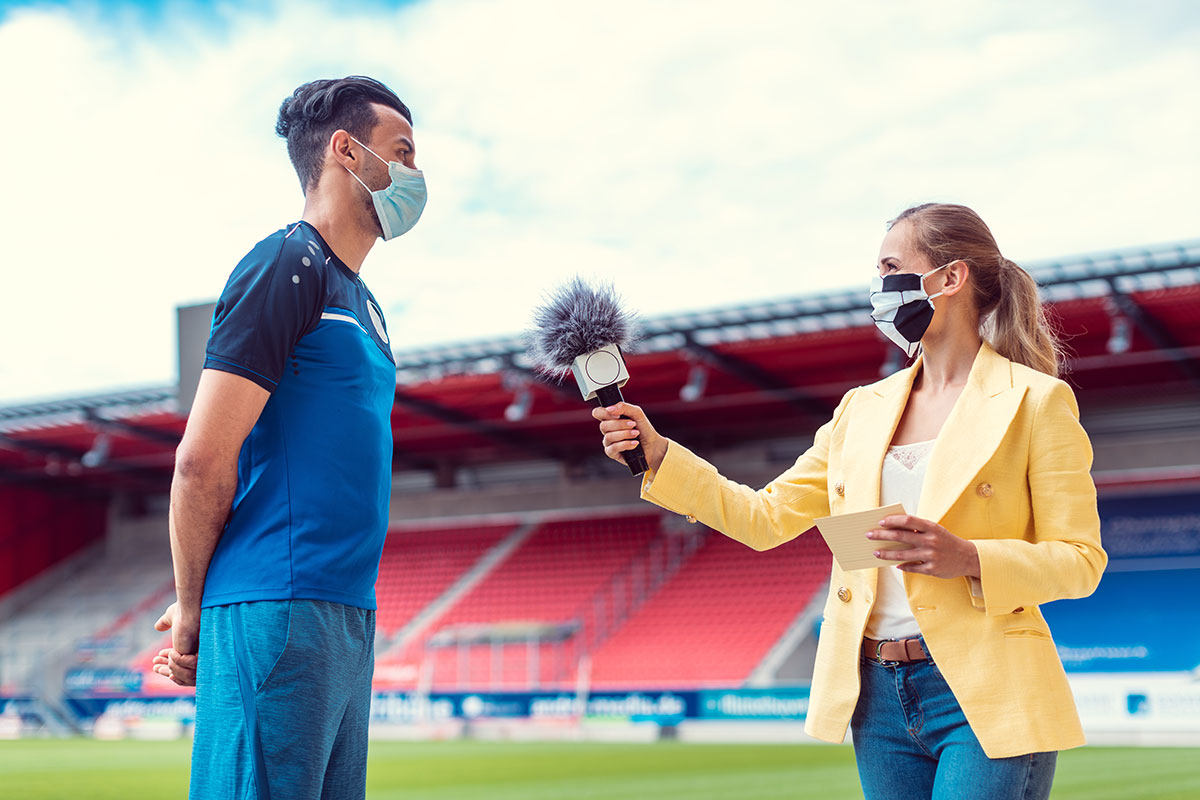Disclaimer: The information on our website is provided for general information purposes only. We make no representations or warranties of any kind, express or implied, about the completeness, accuracy, reliability, suitability or availability with respect to the website or the information contained on our website for any purpose. Any reliance on such information is therefore strictly at your own risk and we are not liable for any damages or losses arising out of or resulting from your reliance on any information contained on our website.
Sports broadcasters are, first and foremost, sports fans! They cover sporting events, typically in real-time, and announce play-by-play action, providing footage on television, radio, and other media outlets. Sports broadcasters work full-time on evenings and weekends and travel to locations of sports events. If you are a sports fan, check out this career, it may be a perfect fit!
How to Become a Sports Broadcaster

Sports broadcasting is a competitive career, and you need to get the appropriate education to enter the field. A bachelor’s degree in sports broadcasting, journalism, communications, or marketing is where you need to focus your education. A degree in broadcasting will target analyzing and how to talk sports on radio and television and on social media to draw listeners. They teach relevant courses in public relations, sports history, editing, and sports writing.
A journalism degree is valuable in this career because a large part of a sportscaster’s job is writing news stories, scripts, and articles for newspapers, magazines, or social media. This field has broad education with courses in liberal arts, economics, reporting, writing, social science, etc.
A degree in communications, or Bachelor of Arts, covers various courses, such as broadcast media, liberal arts studies, mass communication, political language, and writing for media professionals.
A marketing degree offers courses in marketing analytics and research, consumer behavior, principles of marketing, and introduction to marketing management. All of these bachelor’s degrees take four years to complete. Online courses are also available and may help with work and study. Internships are sometimes available for college or university sports teams that give you hands-on experience. Some colleges or universities have extensive alumni network programs in the sports industry that may help with contacts for a job. High school students can take creative writing, English, communication, social science, and work at their school newspaper. A student may be able to tag along with a sports broadcaster at their local games! It never hurts to ask!
Start now to build a reputation in this career, and you can do this by volunteering at your college or universities’ campus radio station. You can volunteer to cover local team sports and develop your sports personality! Get out there! Marketing yourself is another way to introduce yourself to the sports industry. Get to know your local radio stations that schedule many promotions and have contacts in the sports arena. Show enthusiasm!
Networking is essential to get started in this occupation by developing relationships with others in the field. You can observe what you like about their approach and what you don’t and apply it to yourself. You can get help and advice from others and tips on job availability. You’ve got to be determined and stay with it! Many professional sports analysts agree that you need always be aware that people watch you all the time; therefore, never say vocally or on social media anything that would hurt your reputation. Remember, a good reputation and following are vital in this competitive career! You have worked hard to get here, and so have the athletes! Be respectful, and your audience will respect you!
Be sure you save your work as an example to show a potential employer and to review to show how your work is improving. Specific skills needed in this career are having a good voice, clear and audible, that keeps an audience’s attention. They require a good memory for sports statistics, names of past and current players, and what teams they play. A sports broadcaster needs journalistic skills to deliver oral and written stories with professional expertise. You may be a sports fan, but you need to ensure fans know you love it! If you are still interested, keep reading to find out what a sports broadcaster does daily!
Sports Broadcaster Job Description
Sports broadcasters do more than attend games and have fun. Research is a large part of what they do, like game statistics and sports history. Broadcasters study sports news stories and use the facts they learn in their jobs. They write articles for newspapers, magazines, and social media that give current sports news footage. Sports broadcasters read from teleprompters for radio and television sports news broadcasts. They cover a sports event or game, give a play-by-play announcement, and share their predictions with the audience. They keep the sports events exciting through their coverage!
A sports broadcaster can give talks at colleges or universities or the invitation to high schools. Passing along what you have learned is also a great way to build a good reputation! The best part of what a sports broadcaster does is working at what they love best, sports! Good luck!

